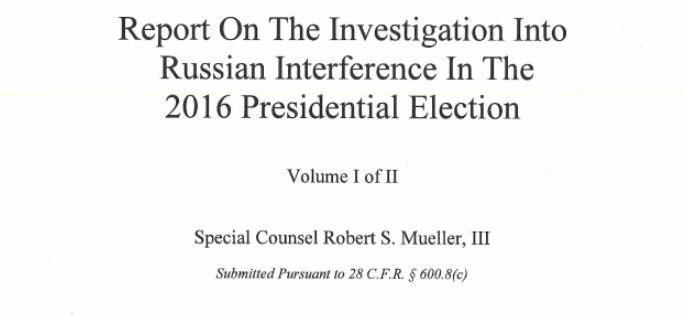Special counsel Robert Mueller examined at least 10 actions President Donald Trump took in office that could have constituted obstruction of justice. Here are seven of the episodes that Mueller investigated.
Feb. 14, 2017 At the end of a meeting with top national-security officials early in his presidency, Trump asked his FBI director, James Comey, to stay behind, then cleared the Oval Office of everyone else, according to congressional testimony by Comey. The president asked that the FBI end an investigation into his first national security adviser, Michael Flynn, calling him a good guy who had been through a lot, according to a memo Comey wrote at the time documenting the encounter. Comey demurred, and Flynn later pleaded guilty to lying to investigators and agreed to cooperate with Mueller.
July 8, 2017 Flying aboard Air Force One with aides as he returned to Washington from a Group of 20 summit in Europe, Trump helped craft a response to a New York Times article about a campaign meeting arranged by his son Donald Trump Jr. with a Russian lawyer promising damaging information on Hillary Clinton. President Trump wanted the statement to give as little information as possible, and his lawyers told Mueller's team that the president "personally dictated" the response. The initial statement was misleading, saying the meeting had been "primarily" about adoptions, without acknowledging the part about Clinton.

Click here to read the redacted Mueller report, or click here to download a PDF of the 448-page document.
FULL COVERAGE:
∙ Mueller's report finally public
∙ Push on in '16 for Clinton emails
∙Arkansas GOP delegation applauds release
∙ Report notes Sanders' Comey claims as false
∙ Probe examined 10 actions on obstruction of justice
The special counsel included Trump's various interactions with his former personal lawyer, Michael Cohen, as part of his obstruction review. That included praise for Cohen early on, as well as Cohen's false testimony to Congress about the length of time that a possible Trump Tower project in Moscow was being worked on during the 2016 campaign. Cohen, according to the special counsel, said he was told by a personal lawyer for the president to "stay on message." The president's aides had said the project discussions ended before the Iowa caucuses in January 2016. They also noted that Trump publicly called Cohen a "rat" after he cooperated with prosecutors.
May 9, 2017 The president first said he fired Comey in May 2017 because of how he handled the investigation into Clinton's emails, but he soon strayed from that explanation. Within days, Trump appeared to say in an NBC News interview that Russia was on his mind when he dismissed Comey, and he told senior Russian officials in the Oval Office that, by firing Comey, he had relieved great pressure on himself.
June 17, 2017 In the weeks after Mueller was appointed in May 2017, Trump tried to force the White House counsel, Don McGahn, to have the Justice Department fire Mueller, citing what the president perceived as conflicts of interest. McGahn thought the president's assertions carried little weight and refused to follow his instructions, he has told investigators.
On Saturday, June 17, 2017, McGahn said, the president called him at home and insisted he have Mueller fired. Fed up with the repeated directive, McGahn drove to the White House, packed up his office and told senior White House officials that he planned to quit. They advised McGahn to ignore Trump, and the lawyer remained in his post another year.
July 2017 Trump made two attempts to have his former 2016 campaign manager, Corey Lewandowski, influence the behavior of his attorney general, Jeff Sessions, according to the report. In a meeting at the White House on June 19, 2017, the president "dictated a message" for Lewandowski to deliver to Sessions, the report says.
"The message said that Sessions should publicly announce that, notwithstanding his recusal from the Russia investigation, the investigation was 'very unfair' to the president, the president had done nothing wrong," the report says, adding that Sessions was to announce he would let the special counsel investigation on election interference continue.
A month later, in another meeting, on July 19, 2017, Trump asked Lewandowski about the status of the message, and Lewandowski said it would be delivered soon. Hours later, Trump had an interview with The New York Times and criticized Sessions. Lewandowski was "uncomfortable" delivering the message, the report says, and he asked a White House official, Rick Dearborn, who had worked previously with Sessions, to do it. Dearborn chose not to do it.
2017 Sessions recused himself from the Russia investigation in March 2017 because of his role as a top Trump campaign supporter before being named attorney general. Infuriated, Trump said that Sessions had betrayed him and that he needed a loyalist at the Justice Department to protect him. In the weeks and months that followed, Trump sought to pressure Sessions to reassert his control over the investigation, asking him to "unrecuse" himself. Sessions refused, prompting Trump to increasingly pressure him to do so, particularly after Mueller was appointed in May 2017.
Jan. 26, 2018 Trump asked aides to disavow a Times article reporting that investigators had learned of the president's attempt to fire the special counsel and threatened to fire McGahn if he refused to rebut the news publicly. The president insisted he had never given the firing directive, and when McGahn disagreed, Trump said he did not remember it that way.
A Section on 04/19/2019
